Sweltering Heat Returns to the Southwest
Special Stories
4 Jul 2018 2:16 PM
Excessive heat will be building across the Southwest again as temperatures soar well into the triple digits in parts of Nevada, California and Arizona. The extra hot temperatures will be sticking around through the weekend. Excessive Heat Warnings and Watches have been issued through Sunday. Highs today may peak to 110 degrees.
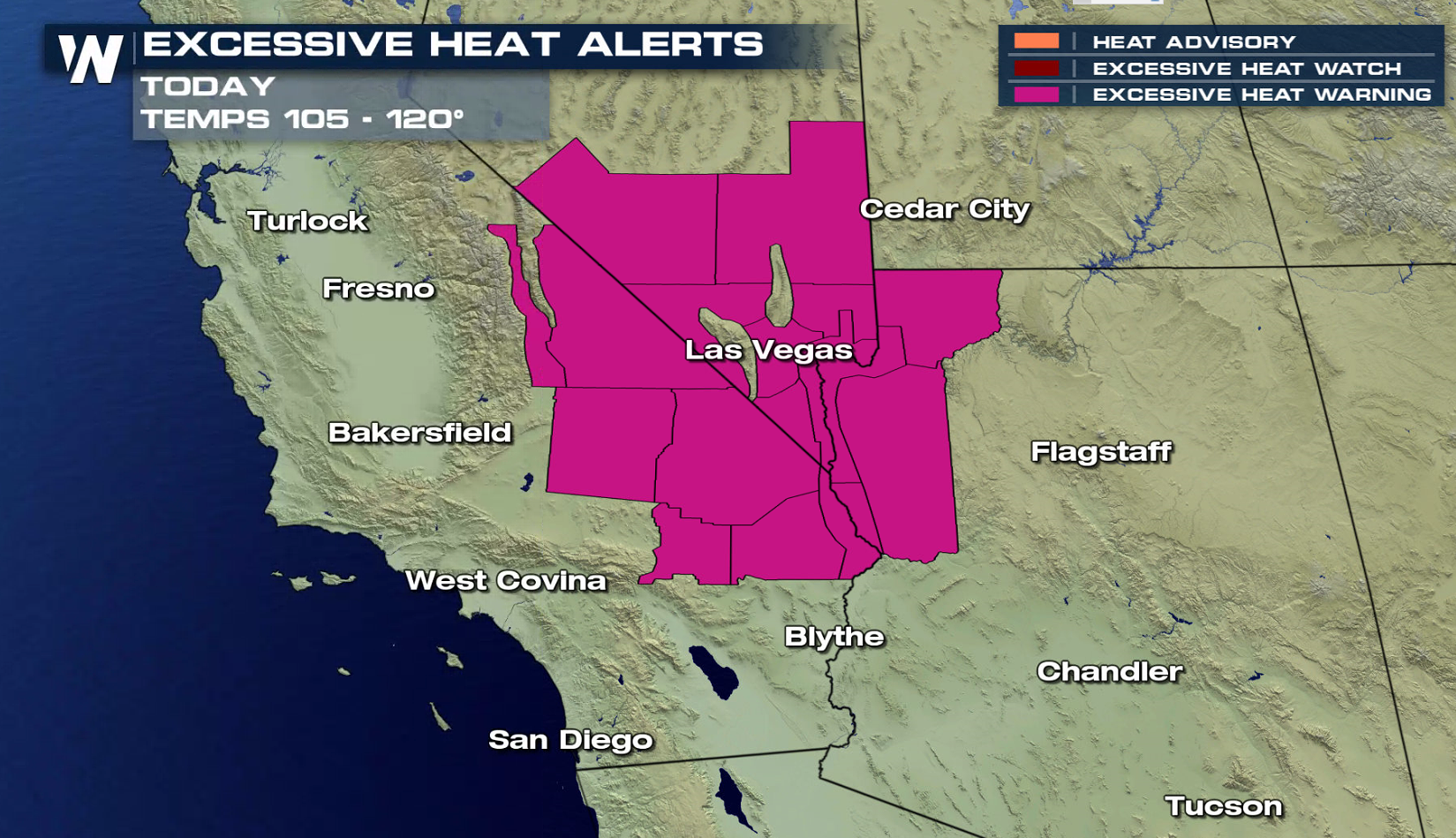
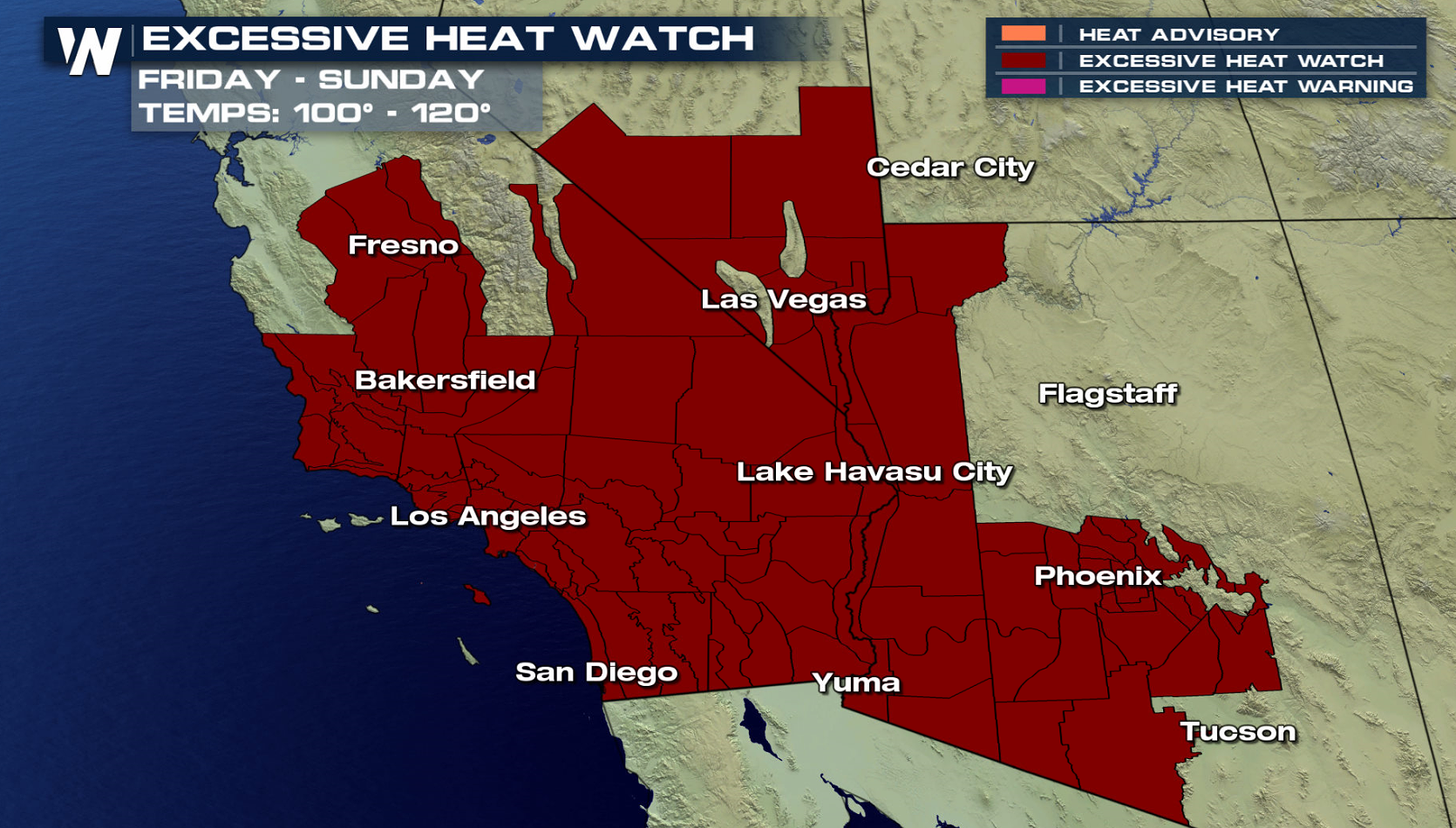
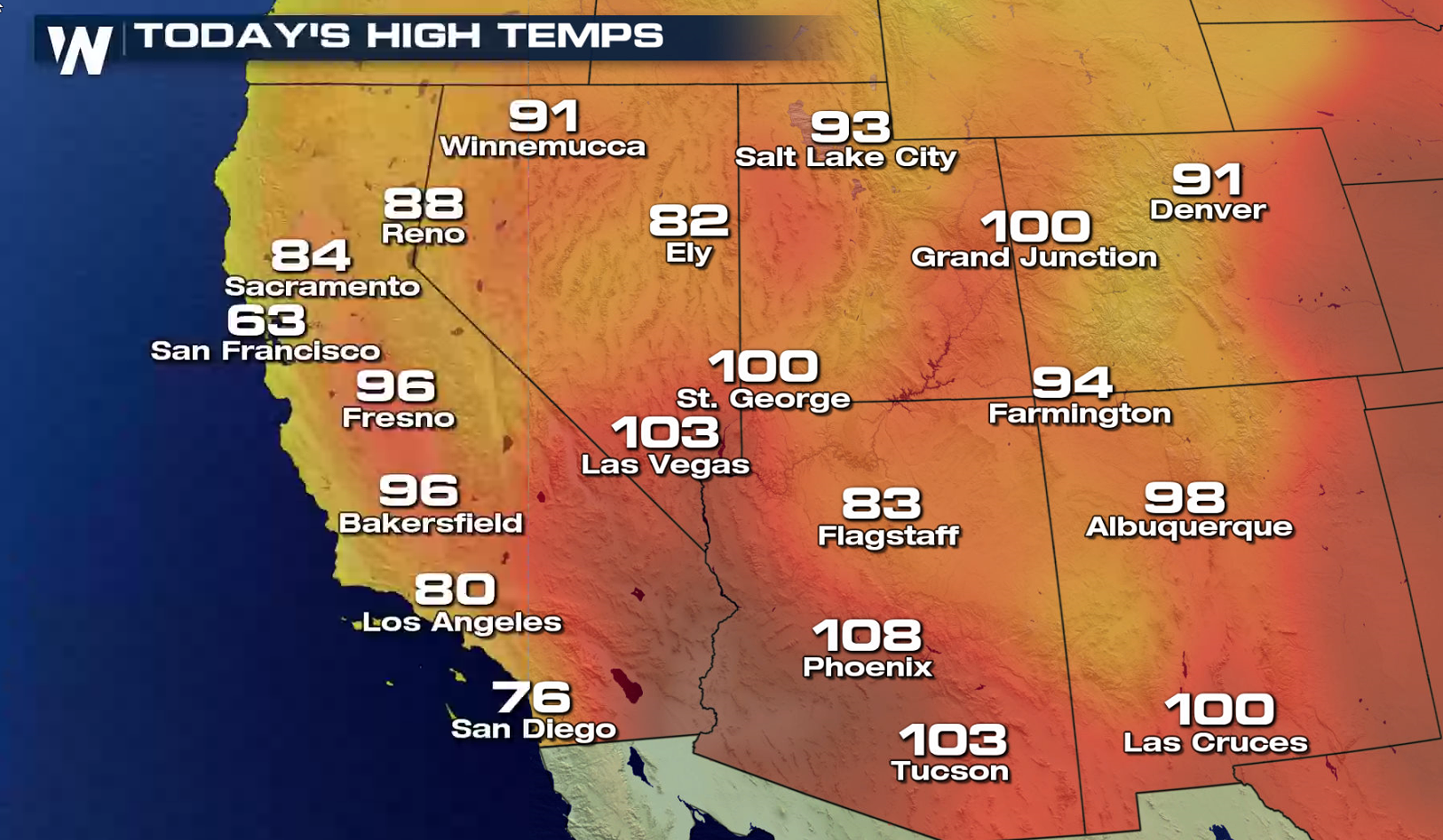 As a high pressure ridge builds from the east, westerly winds will blow like a furnace across the region. Temperatures may reach hit 110 to 120, including Phoenix and Las Vegas. Heat related illnesses such as heat exhaustion and heat stroke will be possible. People most vulnerable include those who are spending lots of time outdoors, those who do not have air conditioning, young children, the elderly, and those with chronic ailments.
Recognize the signs and symptoms of heat illness. Early symptoms include things such as headache, thirst, and muscle cramps. Serious symptoms include weakness, skin that is cool to the touch, fast but weak pulse, nausea, and fainting. Severe symptoms include hot and red dry skin, fast and strong pulse, sweating that has stopped, and unconsciousness. Untreated heat illness can lead to fatal heat stroke.
As a high pressure ridge builds from the east, westerly winds will blow like a furnace across the region. Temperatures may reach hit 110 to 120, including Phoenix and Las Vegas. Heat related illnesses such as heat exhaustion and heat stroke will be possible. People most vulnerable include those who are spending lots of time outdoors, those who do not have air conditioning, young children, the elderly, and those with chronic ailments.
Recognize the signs and symptoms of heat illness. Early symptoms include things such as headache, thirst, and muscle cramps. Serious symptoms include weakness, skin that is cool to the touch, fast but weak pulse, nausea, and fainting. Severe symptoms include hot and red dry skin, fast and strong pulse, sweating that has stopped, and unconsciousness. Untreated heat illness can lead to fatal heat stroke.
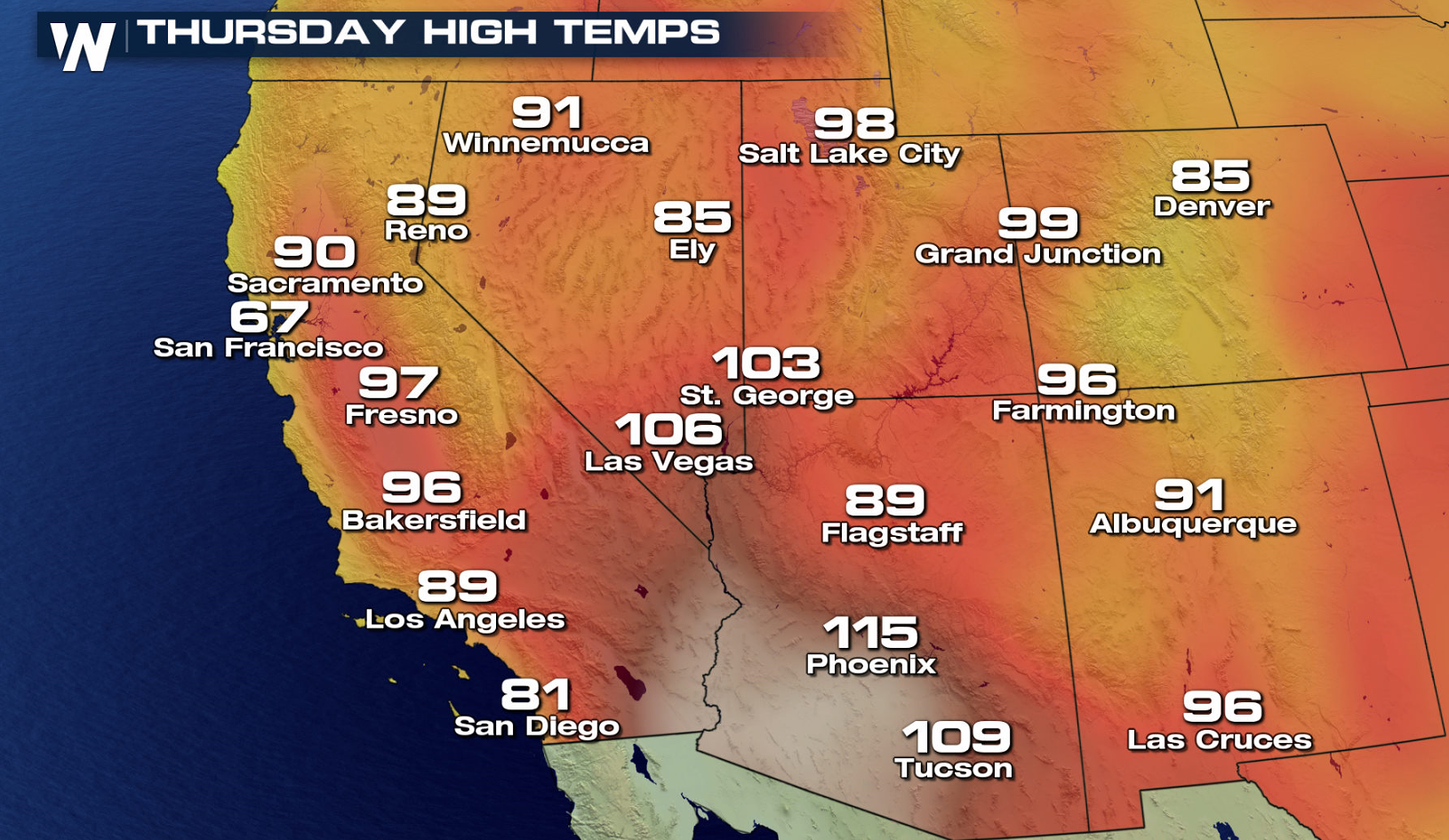
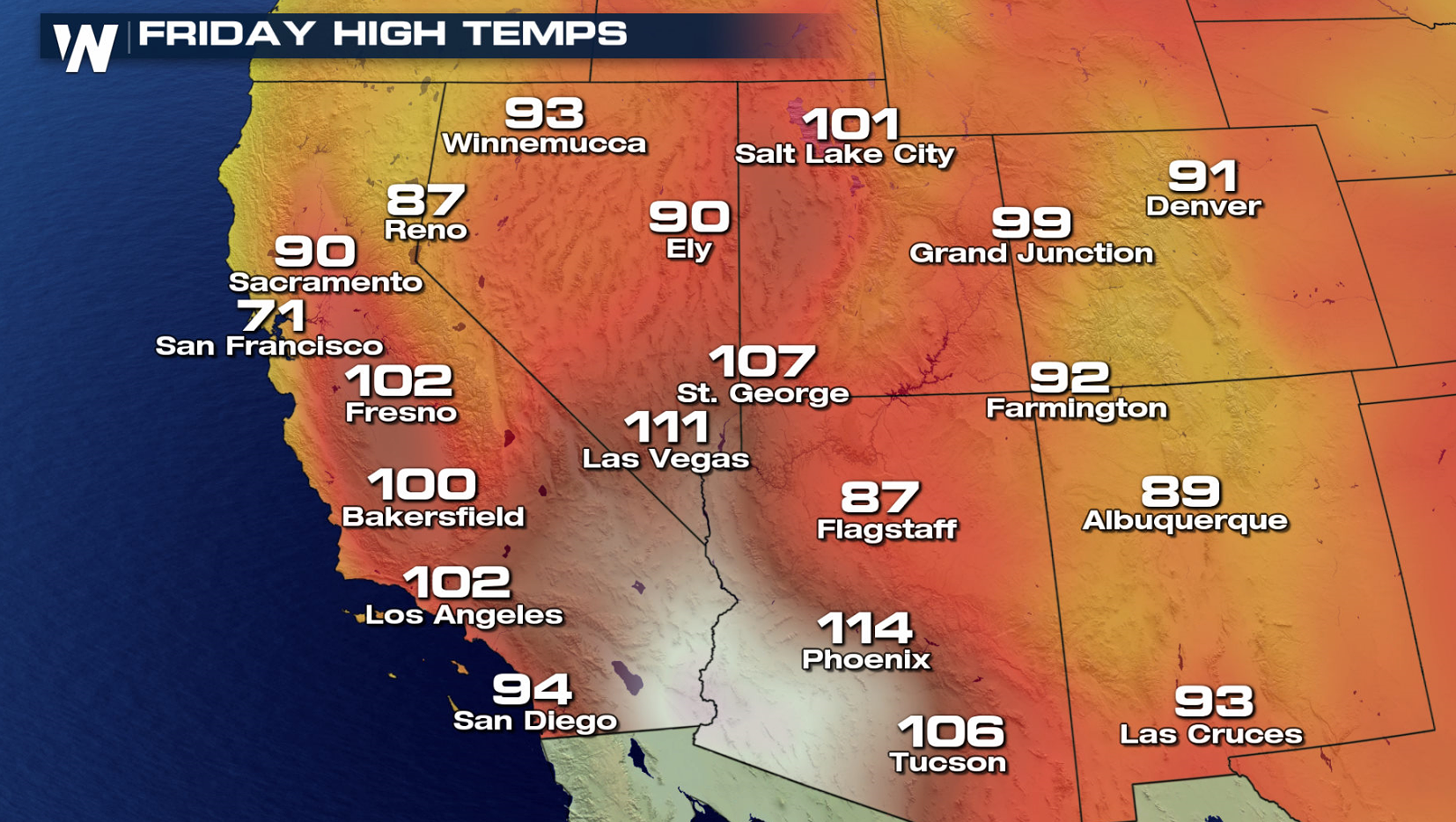
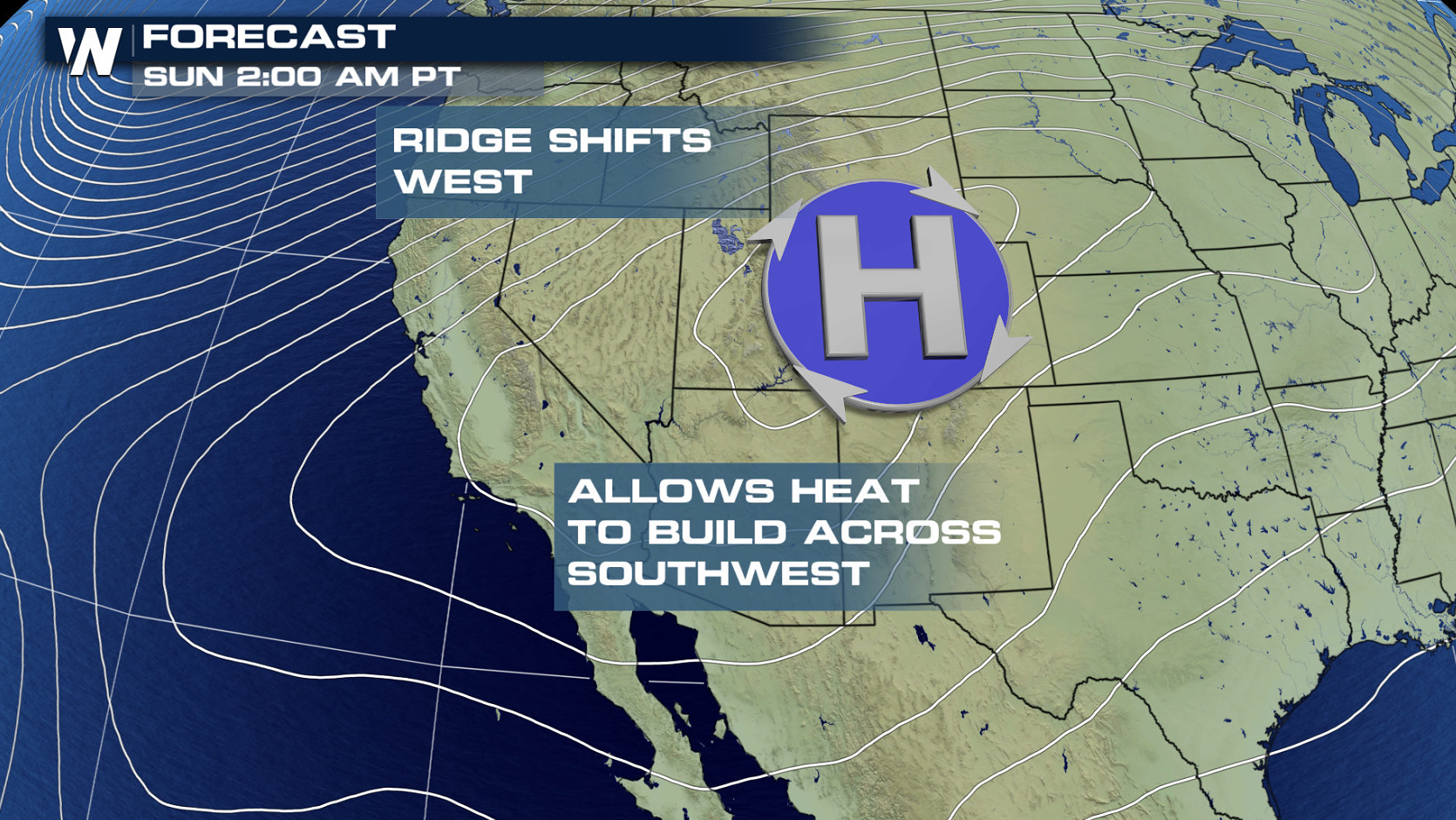 Residents are reminded to drink plenty of fluids, stay in an air-conditioned room, avoid prolonged periods in the sun, and check on relatives and neighbors, especially the elderly. Young children and pets should never be left unattended in vehicles under any circumstances. This is especially true during warm or hot weather when car interiors can reach lethal temperatures in a matter of minutes.
Residents are reminded to drink plenty of fluids, stay in an air-conditioned room, avoid prolonged periods in the sun, and check on relatives and neighbors, especially the elderly. Young children and pets should never be left unattended in vehicles under any circumstances. This is especially true during warm or hot weather when car interiors can reach lethal temperatures in a matter of minutes.

 When possible, reschedule strenuous activities to early morning or evening. Know the signs and symptoms of heat exhaustion and heat stroke. Wear light weight and loose fitting clothing when possible and drink plenty of water. Take extra precautions if you work or spend time outside. To reduce risk during outdoor work the occupational safety and health administration recommends scheduling frequent rest breaks in shaded or air conditioned environments. Anyone overcome by heat should be moved to a cool and shaded location.
For WeatherNation: Meteorologist Mace Michaels
When possible, reschedule strenuous activities to early morning or evening. Know the signs and symptoms of heat exhaustion and heat stroke. Wear light weight and loose fitting clothing when possible and drink plenty of water. Take extra precautions if you work or spend time outside. To reduce risk during outdoor work the occupational safety and health administration recommends scheduling frequent rest breaks in shaded or air conditioned environments. Anyone overcome by heat should be moved to a cool and shaded location.
For WeatherNation: Meteorologist Mace Michaels


 As a high pressure ridge builds from the east, westerly winds will blow like a furnace across the region. Temperatures may reach hit 110 to 120, including Phoenix and Las Vegas. Heat related illnesses such as heat exhaustion and heat stroke will be possible. People most vulnerable include those who are spending lots of time outdoors, those who do not have air conditioning, young children, the elderly, and those with chronic ailments.
Recognize the signs and symptoms of heat illness. Early symptoms include things such as headache, thirst, and muscle cramps. Serious symptoms include weakness, skin that is cool to the touch, fast but weak pulse, nausea, and fainting. Severe symptoms include hot and red dry skin, fast and strong pulse, sweating that has stopped, and unconsciousness. Untreated heat illness can lead to fatal heat stroke.
As a high pressure ridge builds from the east, westerly winds will blow like a furnace across the region. Temperatures may reach hit 110 to 120, including Phoenix and Las Vegas. Heat related illnesses such as heat exhaustion and heat stroke will be possible. People most vulnerable include those who are spending lots of time outdoors, those who do not have air conditioning, young children, the elderly, and those with chronic ailments.
Recognize the signs and symptoms of heat illness. Early symptoms include things such as headache, thirst, and muscle cramps. Serious symptoms include weakness, skin that is cool to the touch, fast but weak pulse, nausea, and fainting. Severe symptoms include hot and red dry skin, fast and strong pulse, sweating that has stopped, and unconsciousness. Untreated heat illness can lead to fatal heat stroke.


 Residents are reminded to drink plenty of fluids, stay in an air-conditioned room, avoid prolonged periods in the sun, and check on relatives and neighbors, especially the elderly. Young children and pets should never be left unattended in vehicles under any circumstances. This is especially true during warm or hot weather when car interiors can reach lethal temperatures in a matter of minutes.
Residents are reminded to drink plenty of fluids, stay in an air-conditioned room, avoid prolonged periods in the sun, and check on relatives and neighbors, especially the elderly. Young children and pets should never be left unattended in vehicles under any circumstances. This is especially true during warm or hot weather when car interiors can reach lethal temperatures in a matter of minutes.

 When possible, reschedule strenuous activities to early morning or evening. Know the signs and symptoms of heat exhaustion and heat stroke. Wear light weight and loose fitting clothing when possible and drink plenty of water. Take extra precautions if you work or spend time outside. To reduce risk during outdoor work the occupational safety and health administration recommends scheduling frequent rest breaks in shaded or air conditioned environments. Anyone overcome by heat should be moved to a cool and shaded location.
For WeatherNation: Meteorologist Mace Michaels
When possible, reschedule strenuous activities to early morning or evening. Know the signs and symptoms of heat exhaustion and heat stroke. Wear light weight and loose fitting clothing when possible and drink plenty of water. Take extra precautions if you work or spend time outside. To reduce risk during outdoor work the occupational safety and health administration recommends scheduling frequent rest breaks in shaded or air conditioned environments. Anyone overcome by heat should be moved to a cool and shaded location.
For WeatherNation: Meteorologist Mace MichaelsAll Weather News
More